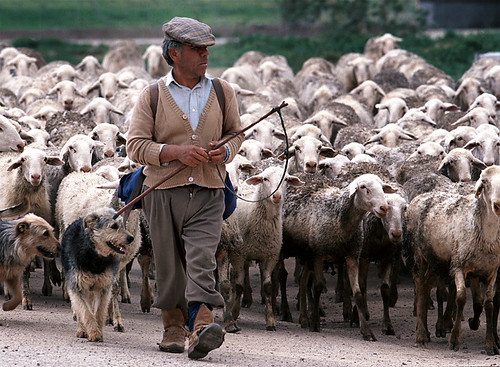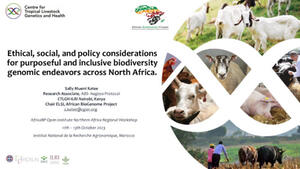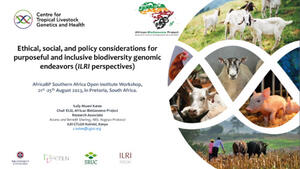
Mobile pastoralism—A 10,000-year-old practice still robust, if threatened, in the Mediterranean today
A Spanish shepherd and his flock (photo via Flickr/Jeromy Johnson).
From the Mediterranean Consortium for Nature and Culture
‘Mobile pastoralism is the movement of people and livestock through the landscape in search of water and pasture, and includes different practices such as transhumance, semi-nomadic and nomadic pastoralism and certain practices of extensive grazing—all involving people, herds and movement, and all having a positive impact on biodiversity.
‘This 10,000 year old cultural practice which still occurs in a wide variety of forms across the Mediterranean Basin, and is important in all the Mediterranean Consortium for Nature and Culture countries, is today threatened. Below are the activities the MCNC is involved in, to help ensure this vital way of life remains robust enough to stand it’s ground in today’s world.
‘For the last 5 years we have been studying the practice of Mobile Pastoralism in the Mediterranean Basin, and the innumerable ways in which it helps protect the environment.
‘On completing an initial assessment of the state of play of the practice in each of our partner countries, it quickly became apparent that a comprehensive document outlining the major arguments in favour of this ancient practice was needed. A document that can be a tool for lobbying against, influencing and changing harmful policies and which will help pastoralist communities the rights and recognition they deserve. . . .
‘With our Spanish partner Trashumancia y Naturaleza taking the lead in collaboration with Pablo Manzano Baena, we’re pleased to release after months of hard work our new report . . . .’
Mobile Pastoralism in the Mediterranean: Arguments and evidence for policy reform and its role in combating climate change presents over 100 arguments detailing the benefits of mobile pastoralism to biodiversity, carbon storage, wildfire prevention, climate change, food security and quality, traditional ecological knowledge, rural economies, tourism—to name a few.
From the press release
‘The many benefits of mobile pastoralism in the Mediterranean, and the world over, are detailed in a new report from the Mediterranean Consortium for Nature and Culture. This 10,000 year old practice, forgotten or lost in some places, may actually be a retro-innovative system of livestock management critical for the sustainability of our planet.
‘“Mobile pastoralism is one of the most efficient livestock farming systems. Its role is essential in achieving some of the most sustainable diets, with attention to animal welfare, and is critical for the future of our planet. Not only does it capture soil carbon and produce high quality, healthy food; without it, we would not be able to maintain its associated diverse ecosystems, beautiful landscapes and rich and fascinating cultural heritage” said co-author, Concha Salguero of Trashumancia y Naturaleza, Spanish partner of the MCNC and an organisation that has been successfully contributing to the revival of the long-distance transhumance on foot in Spain for the past 30 years.
‘However, in spite of the clear benefits it offers, including solutions to some of the modern world’s most pressing problems, mobile pastoralism the world over is often mistakenly perceived as unsustainable. This misunderstanding of the practice has resulted in legislation and policies that undermine it and created hurdles to its sustainability. This, in turn, continues to result in widespread environmental deterioration and the aggravation of misperceptions.
‘“Harmful policies originate in poor understandings of pastoralist livelihoods and interventions designed externally with little consultation with pastoralists” said co-author Pablo Manzano Baena, independent international expert on pastoralist systems. “This document, well-referenced by updated scientific research, constitutes a good guide for positive policies and wider pastoralist involvement”. . . .’
Read the full press release from the Mediterranean for Nature and Culture: A new report from the Mediterranean Consortium for Nature and Culture: Mobile Pastoralism in the Mediterranean: Arguments and evidence for policy reform and its role in combating climate change, 26 Feb 2018.




















